News
Awards of the Annual 2017 Section Meeting
Congratulations to Elena Goloubeva of Webb Institute,
winner of the section's 2017 Distinguished Service Award,
shown being presented her award by Raymond N. Greenwell of Hofstra University!
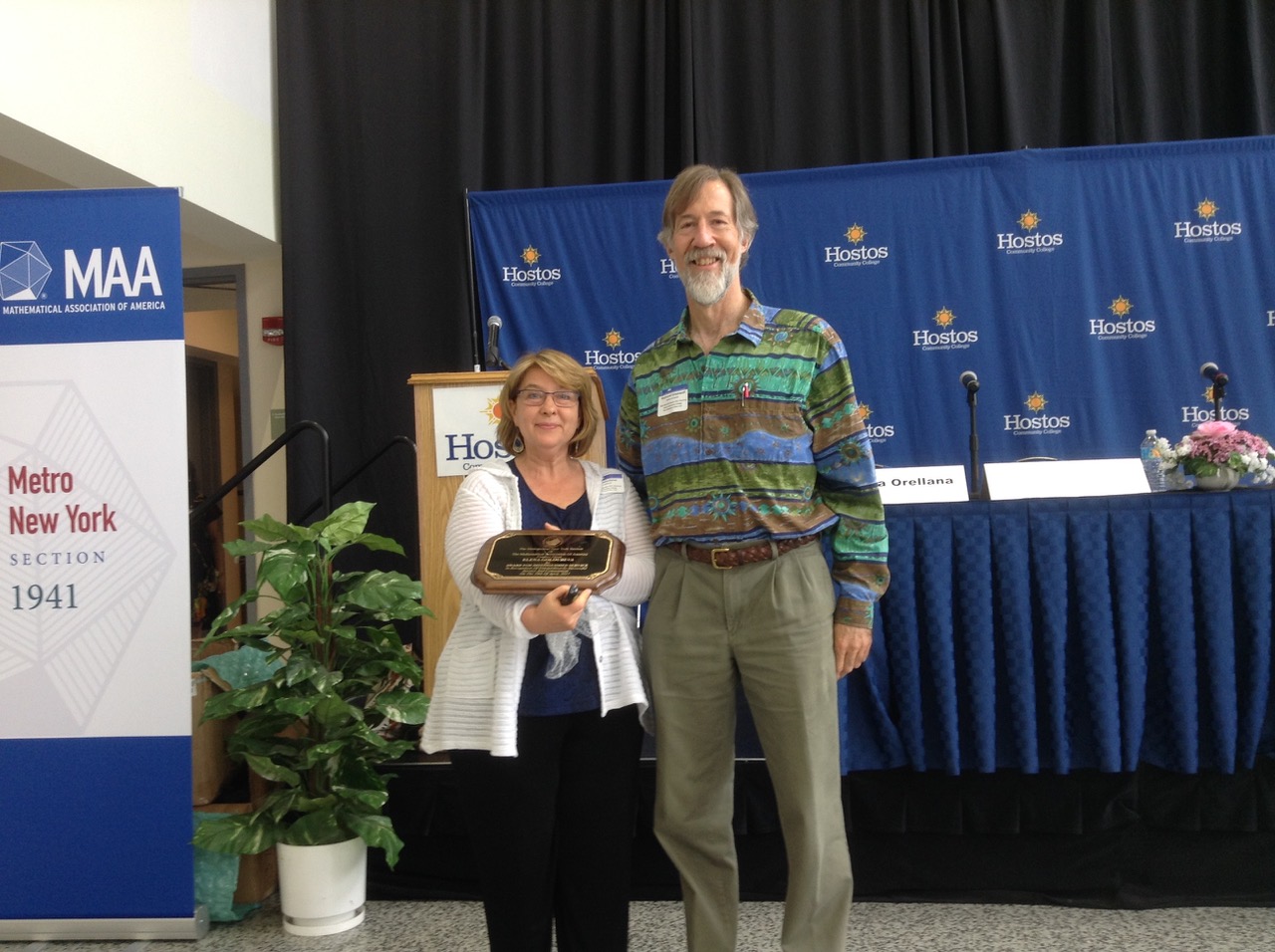
Congratulations to Satyanand Singh of New York City College of Technology,
co-winner of the section's 2017 Distinguished Teaching Award,
shown being presented his award by Janet Liou-Mark of New York City College of Technology!
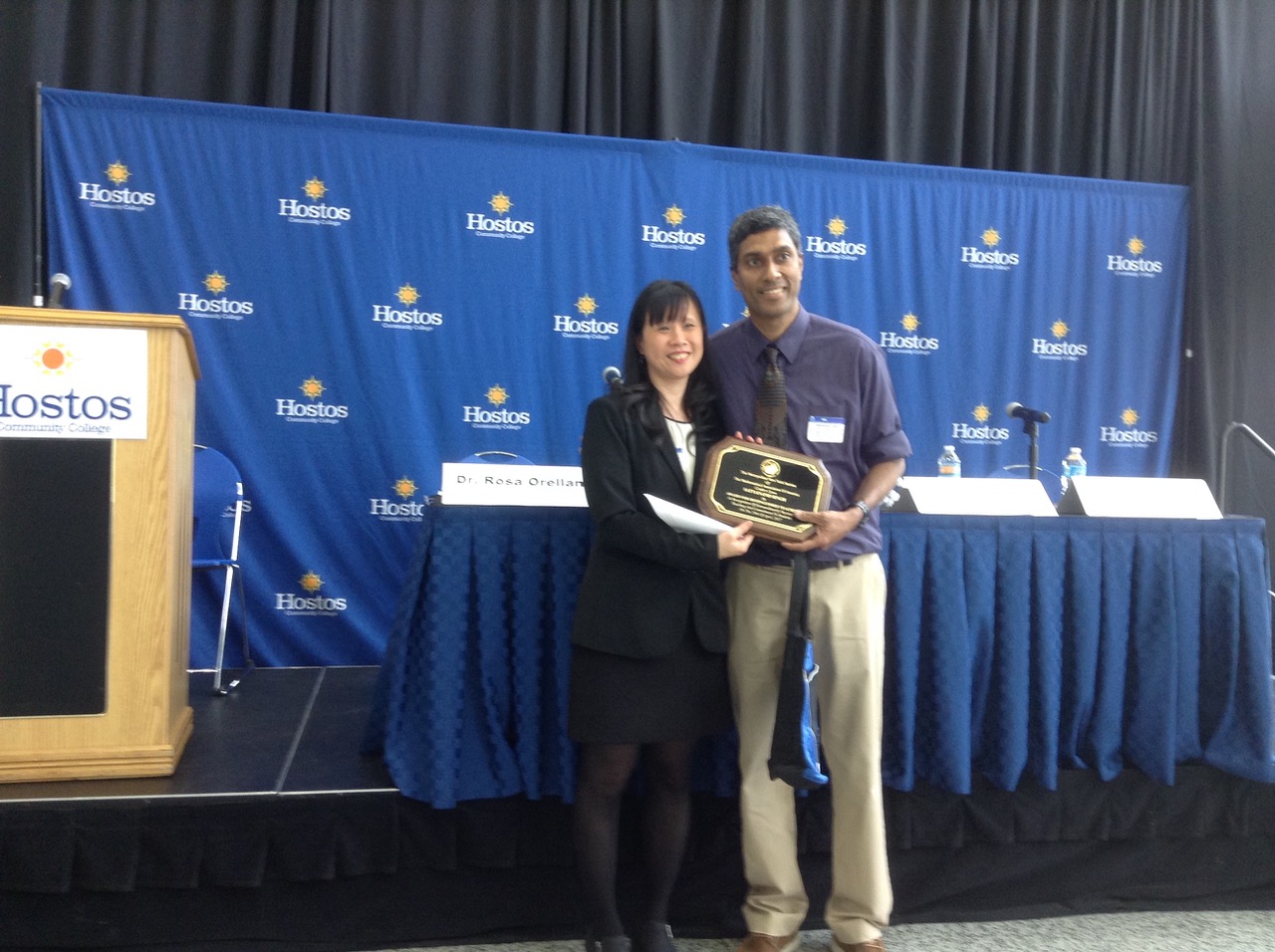
Congratulations to Matthew Leingang of New York University,
co-winner of the section's 2017 Distinguished Teaching Award,
shown being presented his award by David Seppala-Holtzman of St. Joseph's College!
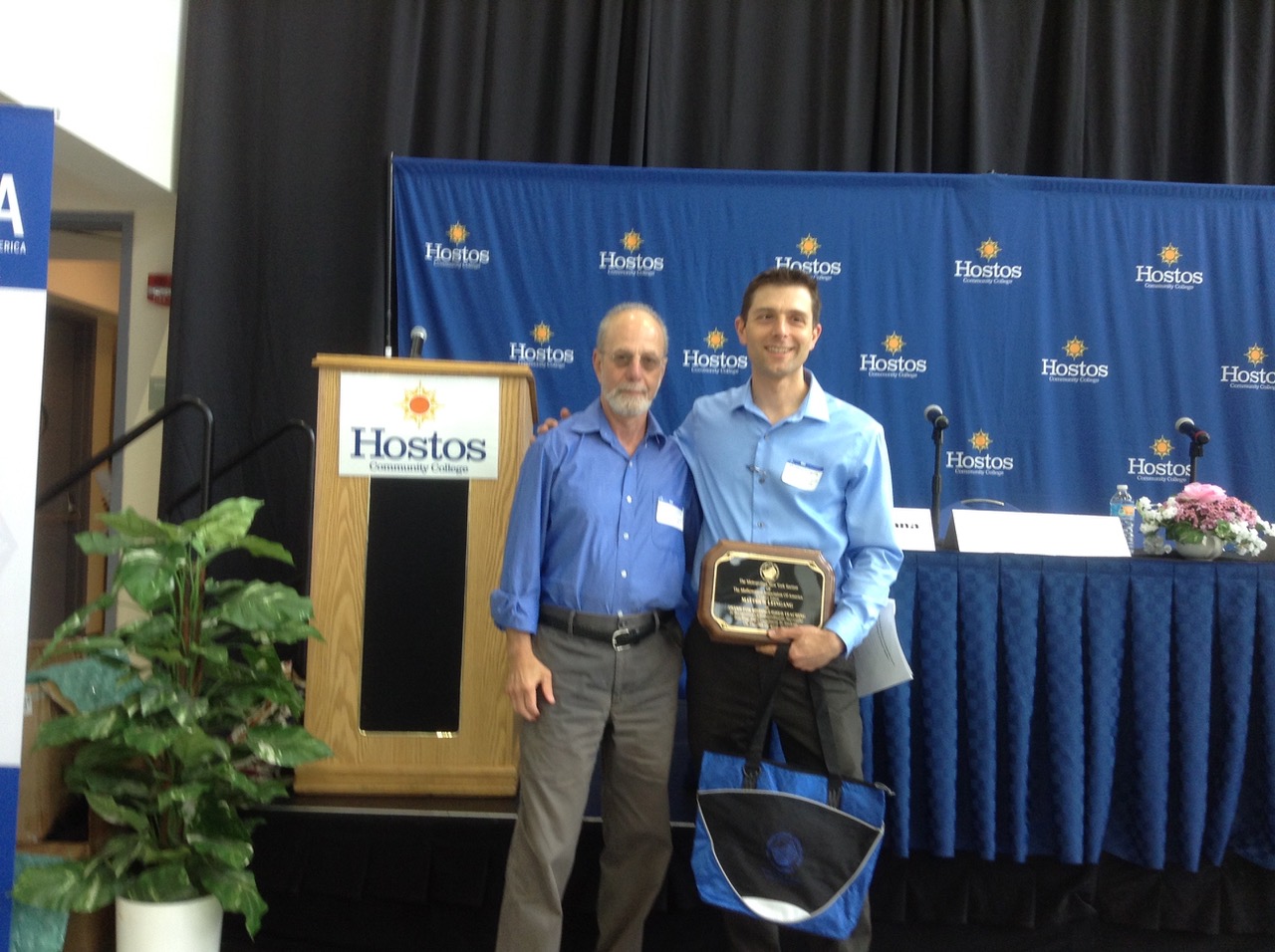
It is with deeply felt sorrow that
we advise you of the passing of a
member of our MAA family:
Professor Calvin Mittman
Mathematics and Computer Science Department
St. John’s University
Professor Calvin Mittman
Mathematics and Computer Science Department
St. John’s University
For many years he was a Liaison of the St. John’s University.
Funeral Service:
Friday, April 14, 2017 at 3:30 PM
Mt. Sinai Chapels
162-05 Horace Harding Expressway
Fresh Meadows, N.Y. 11364
(T) 718-445-0300
Expressions of sympathy may be sent to:
MaryLou McGuinness
Mathematics and Computer Science Department
St. John Hall, 334
Congratulations to Raymond N. Greenwell of Hofstra University, winner of an MAA Meritorious Service Award, shown being presented his award at MathFest in Columbus, OH, on Aug. 4, 2016.
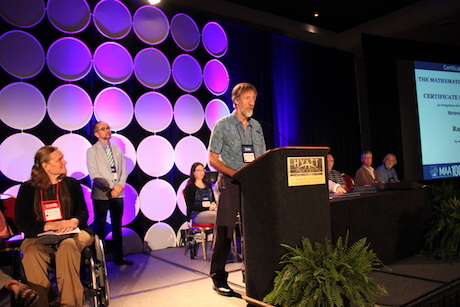
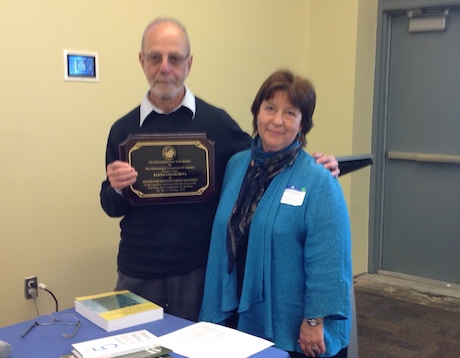
It is with deep regret that I write to inform the mathematics community of the passing of Jack Winn. Jack Winn was a long-time chair of the mathematics department at Farmingdale State College in New York.
In addition, Jack Winn was extremely active in the Metropolitan New York Section of MAA. He started as Treasurer of the Section in 1994. He became Chair of the Section, and served as Chair from 2001 to 2003. In 2005, he became Governor of the Section, and until 2008 he represented the Section on the national level.
In both of the roles, as a department chair and an active member of the section Jack was amazingly influential in many ways that will certainly live long after him in terms of the positive impact he had on so many others' lives.
Over the last quarter century, Farmingdale underwent a total change in its mission from a two-year agricultural and technical college into a four-year college of technology with programs in the applied sciences and technologies relevant to the new Long Island economy. A major aspect of this addressed the need in most fields for considerably more (albeit different) quantitative skills than are traditional. Fortunately, throughout most of that period, the math department was under Jack's extraordinarily capable leadership. The words that come to mind to describe Jack's leadership are vision, encouragement, persuasiveness, and persistence bordering on tenacity. And all of these characteristics were essential.
Under Jack’s vision, all mathematics courses – developmental mathematics, college algebra, precalculus, calculus, and post calculus courses – were transformed to reflect "reform curricula" with the full cooperation of all members of the mathematics department and he gained the solid support of all the partner disciplines for these changes. Jack strongly encouraged and backed any suggested innovative approach and, when needed, he was certainly capable of applying some gentle, yet effective, persuasion.
*All math courses featured conceptual understanding and realistic applications via modeling to balance the underlying theory and algebraic techniques.
*Routine use of technology was integrated into all math offerings.
*Writing and communication skills became important dimensions of most courses.
This philosophy transformed the entire mathematics program into one that directly supports the mathematical needs of most of our other departments. Simultaneously, the courses not only better prepared students for courses in other disciplines, but also are far better attuned to the abilities and interests of our students, the majority of whom would be considered poor math students in traditional skills-oriented courses. In turn, these courses provide the other disciplines with a quantitative foundation on which to build the use of mathematics in their own courses.
As Farmingdale faced the challenge of totally redesigning its academic programs, Alan Tucker invited Jack to assume a leadership role in a project he was organizing under the NSF’s Math Across the Disciplines initiative. The Long Island Consortium for Interconnected Learning (LICIL) project was intended to build connections between mathematics and other quantitative disciplines by promoting both a greater degree of realistic applications in mathematics courses and a greater degree of mathematical sophistication in the courses in the physical, life, and social sciences, business, technology, and the humanities.
The project provided the framework for involving large numbers of faculty in the development and implementation of many curricula changes in this spirit. The most significant legacy of LICIL was the fundamental changes in approach and student-centered and multidisciplinary-centered attitudes toward teaching on the part of both faculty and the administration. Under Jack's direction and encouragement, all math faculty worked collaboratively with faculty from areas as diverse as physics, chemistry, biology, economics, business, fine art, sociology, and linguistics
In addition,
*Prior to Farmingdale's being granted a baccalaureate program in applied mathematics, Jack and Alan Tucker created a unique dual-enrollment program with the Department of Applied Mathematics at SUNY Stony Brook. Any applied mathematics student at Farmingdale was automatically enrolled at Stony Brook as well. The students completed two to three years of mathematics courses at Farmingdale and then were guaranteed transfer status to Stony Brook to complete the bachelor’s degree and so received two degrees, one from Farmingdale and another from Stony Brook.
*Under Jack's encouragement, the math department received several grants to examine the implications of hand-held computer algebra systems on the entire curriculum from introductory algebra through upper division offerings. The math faculty have worked with colleagues from the other quantitative disciplines to develop comprehensive strategies to either implement such technology or to modify the content of courses to reflect the readily available technology when it is not actually used by the students.
*Jack spearheaded the development of an Emerging Scholar Program (ESP) based on Uri Treisman's program at UC Berkeley that serves all students in precalculus, calculus I and calculus II who opt to participate. The students work on non-routine problems under the supervision of undergraduate teaching assistants in a workshop setting.
*In the process of making all these changes, Farmingdale's mathematics program was named a national model as a program linking mathematics to other disciplines by the MAA in its Models of Quantitative Literacy volume and in its Undergraduate Mathematics for the Life Sciences: Processes, Models, Assessment, and Directions volume, and by AMATYC in its Crossroads in Mathematics: Programs Reflecting the Standards volume.
*Jack also spearheaded the development of a Center for Applied Mathematical Sciences (CAMS) in which the mathematics faculty work with representatives of local business, industry, and government to identify mathematical problems that arise in their operations. In turn, individual and small groups of students at all curriculum levels (including introductory statistics and precalculus) work under the supervision of the math faculty to solve these problems for the originating company or agency.
*Jack anticipated the need to develop mathematics courses that will support new baccalaureate program in the biosciences and in applied economics. Both fields are rapidly changing to reflect a much greater level of quantitative study, but traditional mathematics courses do not provide the right foundation. Jack helped Farmingdale to organize and host a special invited workshop on economics on behalf of the MAA’s CRAFTY committee as part of its Curriculum Foundations project in which the economists developed recommendations to the mathematics community on the current mathematical needs of their field. Their report calls for math courses that emphasize conceptual understanding and mathematical model/problem solving starting at the precalculus level. Jack was also responsible for Farmingdale being awarded a major NSF grant to develop a new joint mathematics program with the biosciences.
To put Jack's accomplishments into perspective, at virtually every school I've heard of, the math department is invariably the whipping boy for the administration that blames them for being heedless of the needs of the students and for unacceptably high DFW rates. At Farmingdale, in contrast, the math department has been held up as the positive role model for all other departments to emulate.
The legacy that Jack leaves behind is not just the incredible impact he had on the faculty, the students, the administration, the institution at Farmingdale and on the Metropolitan New York Section of MAA. More significantly, his positive accomplishments should serve as a model for all MAA officers and department heads in providing vision, leadership, encouragement, and support to improve mathematics education across their own institutions.
-------Sheldon P. Gordon, Farmingdale State College
